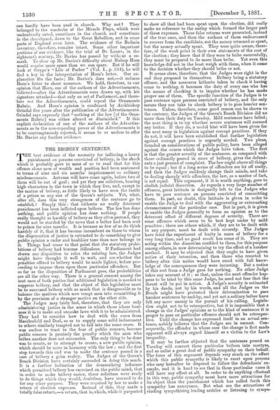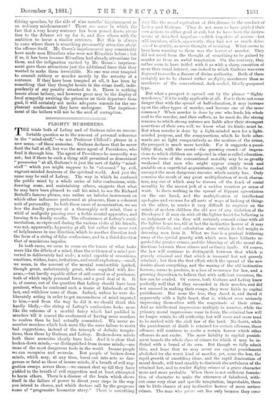THE BRIBERY SENTENCES.
THE best evidence of the necessity for inflicting a heavy punishment on persons convicted of bribery, is the shock which it probably gave to most of us to read that for this offence alone men of wealth and position had been sentenced to terms of nine and six months' imprisonment as ordinary misdemeanants. Autumn will have come again, before two of them will be out of gaol ; and yet they are solicitors, bearing high characters in the town in which they live, and, except in the matter of bribery, as little likely to have seen the inside of a prison as any one of the Queen's subjects. Yet, what, after all, does this very strangeness of the sentence go to establish ? Simply this : that hitherto no really deterrent punishment has been inflicted upon bribers. The law has done nothing, and public opinion has done nothing. If people really thought as harshly of bribery as they often pretend, they would not be startled by the news that a briber had been sent to prison for nine months. It is because so few of us do think harshly of it, that it has become incumbent on those to whom the dispensation of justice is entrusted to do something to give public opinion a ruder and healthier tone than now belongs to it. Things had come to that point that the statutory prohi- bitions of bribery had become ridiculous. If Parliament had shown any disposition to relax the existing law, the Judges might have thought it well to wait, and see whether the penalties affixed to bribery would be made lighter, before pro- ceeding to impose them upon these particular offenders. But so far as the disposition of Parliament goes, the probabilities are all the other way. There is a general consent among the best men of both parties that additional legislation is needed to suppress bribery, and that the object of this legislation must be to surround bribery with so much that is disagreeable as to balance the motives which now tempt men into committing it by the provision of a stronger motive on the other side.
The Judges may fairly feel,.therefore, that they are only administering justice in the sense in which those whose busi- ness it is to make and unmake laws wish it to be administered. They had to consider how to deal with the cases from Macclesfield and Deal, so as to supply some solid inducement to others similarly tempted not to fall into the same snare. It was useless to trust to the fear of public censure, because public censure is precisely the penalty which the man who bribes another does not encounter. The only thing to be done was to create, or to attempt to create, a new public opinion, which should be more in harmony with the law ; and the first step towards this end was to make the sentence passed in a case of bribery a grim reality. The Judges of the Queen's Bench Division have certainly succeeded in doing this much. It is a further indication of the demoralising influence which permitted bribery has exercised on the public mind, that in order to make bribery easier, these solicitors were ready to do things which they would, doubtless, have scorned to do for any other purpose. They were required by law to make a return of election expenses. Instead of this, they made a totally false return,—a return, that is, which, while it purported to show all that had been spent upon the election, did really make no reference to the outlay which formed the larger part of those expenses. These false returns were presented, instead of the true ones, and then the authors of them endeavoured to recover from the candidate, not the money returned as spent, but the money actually spent. They were quite aware, there- fore, of the weak point in their own statements of the cost of the election ; they knew that if they were to bribe successfully, they must be prepared to do more than bribe. Yet even this knowledge did not in the least weigh with them, when it came to the decision whether they should bribe or not.
It seems clear, therefore, that the Judges were right in the end they proposed to themselves. Bribery being a statutory offence, and the measures hitherto taken to check it havin'g come to nothing, it becomes the duty of every one who has the means of checking it to inquire whether he has made proper use of them. The specific function of the Judges is to pass sentence upon persons convicted of bribery, and the only means they can take to check bribery is to pass heavier sen- tences. Unless, therefore, some good reason can be shown to the contrary, the Judges of the Queen's Bench Division did no more than their duty on Tuesday. Mild sentences have failed; the next thing is to try whether severe sentences will succeed any better. If they do, a useful hint will have been given for the next essay in legislation against corrupt practices. If they do not, it will have been established that further legislation against corrupt practices is urgently needed. Two pleas, founded on considerations of public policy, have been alleged against the course which the Judges have taken. The first is that the greater severity of the sentences, as compared with those ordinarily passed in cases of bribery, gives the defend- ants a just ground of complaint. The law ought above all things to be equal ; but if a long series of offenders are let off easily, and then the Judges suddenly change their minds, and take to dealing sharply with offenders, the law, as a matter of fact, is not equal. This argument, if it is worth anything, goes to abolish judicial discretion. As regards a very large number of offences, great latitude is designedly left to the Judges who have to pass sentence on persons convicted of committing them. In part, no doubt, this latitude is given in order to enable the Judge to deal with the aggravating or extenuating circumstances of the particular case. But in part, it is given to enable the Judges generally to form an opinion as to the deterrent effect of different degrees of severity. There are some offences which seem to be best kept under by mild penalties ; there are others which, if they are to be dealt with to any purpose, must be dealt with severely. The Judges have tried the experiment of lenity in cases of bribery for a very long time, and no good result has come of it. They are acting within the discretion confided to them, for this purpose among others, in now determining to try the effect of a harsher method. It may be objected that they ought to have given notice of their intention, and then those who resorted to bribery after this notice would have erred with full know- ledge of the consequences they were incurring. But a notice of this sort from a Judge goes for nothing. No other Judge takes any account of it ; so that, unless the next offender hap- pens to be tried by this same Judge, he need not fear that the threat will be put in action. A Judge's severity is estimated by his deeds, not by his words, and all the Judges on the Bench might have protested their determination to pass harsher sentences by-and-by, and yet not a solitary briber have felt any more uneasy in the pursuit of his calling. Legisla- tion ought not to be retrospective, but it is impossible that a change in the Judges' opinions as to the kind of sentences it is proper to pass on particular offences should not be retrospec- tive. Until the change has expressed itself in an actual sen- tence, nobay believes that the Judges are in earnest. Con- sequently, the offender in whose case the change is first made apparent will always regard himself as a victim to the Law's inequality.
It may be farther objected that the sentences passed on Tuesday will convert these particular bribers into martyrs, and so enlist a great deal of public sympathy on their behalf. The force of this argument depends very much on the effect which this public sympathy is likely to exert upon persons who may hereafter be disposed to follow the defendants' ex- ample, and it is hard to see that in these particular cases it will have any effect at all. In order to do anything effectual in this way, public sympathy must have more attractions for its object than the punishment which has called forth this sympathy has annoyance. But what are the attractions of reading sympathising leading articles or listening. to sympa- thising speeches, by the side of nine months' imprisonment as an ordinary misdemeanant ? There are cases in which the fact that a very heavy sentence has been passed draws atten- tion to the defence set up for it, and fires others with the ambition to incur a similar sentence. But this is alWays in cases where there is something presumably attractive about the offence itself. Mr. Green's imprisonment may conceivably have made men Ritualists who were not Ritualists before ; but if so, it has been because Ritualism had already attractions for them, and the indignation excited by Mr. Green's imprison- ment gave those attractions just the additional force that they wanted to make them irresistible. No one was ever tempted to commit robbery or murder merely by the severity of a sentence. If they have been tempted at all, it has been by something that they thought heroic in the crime itself, inde- pendently of any penalty attached to it. There is nothing heroic about bribery, and however great may be the display of local sympathy awaiting the prisoners on their departure from gaol, it will certainly not make adequate amends for the un- pleasant confinement they have undergone. The imprison- ment of the bribers will not be the seed of corruption.







































 Previous page
Previous page